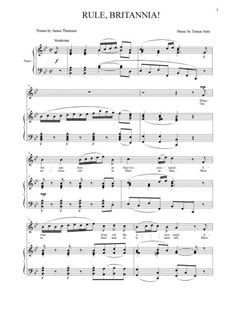
This most popular of all English national airs was first heard in London in 1745 and achieved instant popularity. The song was included in a masque, Alfred, co-written by Thomson and David Mallet and first performed at Cliveden, country home of Frederick, Prince of Wales, to celebrate the accession of George I and the birthday of the Princess Augusta. The featured image (detail) is a portrait of George III of the United Kingdom (1762) by Allan Ramsay, and is in the public domain, courtesy of Wikimedia Commons.Rule Britannia is a song, originating from the poem Rule Britannia by James Thomson, and put to music by Thomas Arne in 1740. Eliot’s call to “redeem the time, redeem the dream.” The Imaginative Conservative offers to our families, our communities, and the Republic, a conservatism of hope, grace, charity, gratitude, and prayer. We hope that The Imaginative Conservative answers T.S.

Others focus on the silver lining which may be found in the next generation of traditional conservatives who have been inspired by Dr. Some conservatives may look at the state of Western culture and the American Republic and see a huge dark cloud which seems ready to unleash a storm that may well wash away what we most treasure of our inherited ways.

Bradford, Eric Voegelin, Christopher Dawson, Paul Elmer More, and other leaders of Imaginative Conservatism. Eliot, Edmund Burke, Irving Babbitt, Wilhelm Roepke, Robert Nisbet, Richard Weaver, M.E. We address culture, liberal learning, politics, political economy, literature, the arts, and the American Republic in the tradition of Russell Kirk, T.S. We hope you will join us in The Imaginative Conservativ e community. The Imaginative Conservative is an online journal for those who seek the True, the Good and the Beautiful. Will you help us remain a refreshing oasis in the increasingly contentious arena of modern discourse? Please consider donating now. The Imaginative Conservative applies the principle of appreciation to the discussion of culture and politics-we approach dialogue with magnanimity rather than with mere civility. You will find it there in the second movement. Beethoven found it musically less fertile and wrote half-length variations, although the tune returned to him unprompted with he was composing his Piano Sonata No. It was performed to celebrate the accession of George II, with the aim of underlining this German ruler’s patriotic credentials, and it obtained popular appeal in 1745, at the same time as God Save the King was established as the national hymn. This rousing exhortation was first heard in Alfred, a masque by Thomas Arne about Alfred the Great, the king who burned the cakes. Most of the extant recordings are by pianists of little renown.Īnd of the Variations on “Rule Britannia,” Mr. In modern times it is seldom performed in major halls and has been commercially recorded no more than two dozen times, which I find a little surprising. Of the Variations on “God Save the King,” musicologist Norman Lebrecht notes,ĭespite the rich revenues it generated for publishers, the popularity of Beethoven’s composition faded and is missed the cut for inclusion in the final catalogue of his works, hence the WithoutOpus number attached. If ever you needed proof of humour in his music, here it is. It makes a great theme for variations, and Beethoven has a lot of fun with it.

Pianist Angela Hewitt remarks:Ĭoncerning the 7 Variations on ‘God save the King’, WoO78, Beethoven made the comment that he wanted to ‘show the English what a blessing they have’ with that tune…. Ludwig van Beethoven’s Variations on “God save the King” and Variations on “Rule Britannia” for piano were published in 1803.


 0 kommentar(er)
0 kommentar(er)
